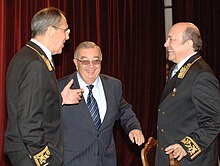Yevgeny Maximovich Primakov
Evgeni Maximowitsch Primakov ( Russian Евгений Максимович Примаков , scientific transliteration Evgenij Maksimovič Primakov ; born October 29, 1929 in Kiev , Ukrainian SSR ; † June 26, 2015 in Moscow ) was a Russian politician and diplomat. Among other things, he was the director of the foreign intelligence service, foreign minister and prime minister of Russia .
Ascent

Primakow studied economics and received his doctorate in 1956. His parallel studies in Oriental Studies ( Indology ) led him first as a correspondent to the Middle East , then he became director of the Orient Institute of the Academy of Sciences , then of the Institute for World Economy and International Relations , then head of foreign intelligence for the Soviet secret service KGB .
Here he was seen as the leading head of the group called Arabists , which, for example, advocated at least indirect support for Iraq during the Kuwait War ; Primakov was said to have excellent relations with his president Saddam Hussein . He got into a rivalry with the more pro-American Foreign Minister Eduard Shevardnadze , who is said to have thwarted Primakov's mediation efforts at the last minute - Primakov, as special envoy, allegedly persuaded Saddam Hussein to give in a few hours before the start of the US ground offensive.
Mikhail Gorbachev appointed him to the Central Committee of the CPSU and in 1991 chairman of the Federation Soviet . Here he campaigned in vain for economic reforms (opening up Siberia and the Far East) and for Gorbachev's new union treaty.
After the August coup , Gorbachev appointed Primakov as First Deputy Head of the KGB and Head of the KGB's First Headquarters in September 1991.
Primakov was confirmed as head of the foreign intelligence service SWR by the new Russian President Boris Yeltsin , who replaced the ZSR in December 1991. The ZSR (Zentralnaja Sluschba Raswedki) emerged in October 1991 from the First Headquarters of the KGB, which was responsible for foreign intelligence. He held the office of SWR director until 1996. As head of the SWR, Primakov reported personally to Yeltsin.
Foreign Minister and Prime Minister
Under Russian President Boris Yeltsin, he was appointed Foreign Minister in January 1996 in place of Andrei Kozyrev, who had been rejected by the Communists as being too NATO-friendly . Since then, Primakov has endeavored to regain Russian influence in the Middle East, a three-way alliance with India and China and the union with Belarus , whose President Lukashenka describes himself as a student of Primakov. He accused the USA of immediately and massively thwarting even the smallest attempt at reintegration between the former Soviet republics.
On September 11, 1998, he was finally appointed Prime Minister. Yeltsin had first tried to appoint Viktor Chernomyrdin for the second time , but the Duma refused to confirm. During Yeltsin's incapacity for office (alcohol problems or heart operations), the parliament granted Prime Minister Primakov the official duties and powers as de facto vice-president against the will of the president. Economically, he fought against the effects of the Asian crisis on Russia. In terms of foreign policy, he protested against the Kosovo war in Yugoslavia in 1999 and provoked a diplomatic scandal by canceling his state visit to the USA. Primakov's opponents in the vicinity of the president (the family ) finally achieved Yeltsin's removal in May 1999. His successor was first Minister of the Interior Sergei Stepashin , and from August 1999 then head of the secret service, Vladimir Putin .
After that, he was considered the most promising candidate in the next presidential election, against which US politicians in Moscow repeatedly voiced strong concerns and protests. His Fatherland - All Russia party formed an electoral alliance with Moscow's Mayor Yuri Luzhkov . Russian Communists also favored him for a short time, but an election agreement failed.
retreat

The turnaround came with the second Chechnya war , which suddenly made Prime Minister Putin, who had previously had no chance, but who was determined and populist, popular. Primakov's efforts to find a peaceful solution together with then President of Ingushetia , Ruslan Auschew , led to his increasing isolation.
After Luzhkov had also dropped Primakov in the run-up to the elections, the latter withdrew his candidacy and also renounced the candidacy as parliamentary president. Putin became president, but Primakov remained the chairman of his party's faction and was president of the Russian Chamber of Commerce and Industry until his resignation in February 2011.
Since May 26, 2008 Primakov was a member of the Presidium of the Russian Academy of Sciences .
Works
- In the shadow of power: politics for Russia. Herbig, Munich (2001)
- The world after September 11th, Мир после 11 сентября (2002)
- Russian Crossroads (2004)
- Russia and the Arabs: Behind the Scenes in the Middle East from the Cold War to the Present (2009)
Awards (selection)
- 2004: Order of Prince Yaroslav the Wise (5th class)
- 2007: Great Golden Decoration on Ribbon for Services to the Republic of Austria
- 2012: Demidow Prize
Web links
- Literature by and about Evgeni Maximowitsch Primakow in the catalog of the German National Library
- Biography and portrait
Individual evidence
- ↑ Russian Ex-Foreign Minister Primakov Dies at 85
- ↑ Евгений Примаков вошел в состав президиума РАН. lenta.ru, June 2, 2008, accessed June 27, 2015 (Russian).
- ↑ List of all decorations awarded by the Federal President for services to the Republic of Austria from 1952 (PDF; 6.9 MB)
| personal data | |
|---|---|
| SURNAME | Primakov, Yevgeny Maximowitsch |
| ALTERNATIVE NAMES | Примаков, Евгений Максимович (Russian spelling) |
| BRIEF DESCRIPTION | Russian politician |
| DATE OF BIRTH | October 29, 1929 |
| PLACE OF BIRTH | Kiev |
| DATE OF DEATH | June 26, 2015 |
| Place of death | Moscow |

